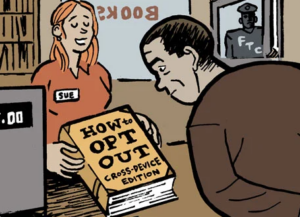 “We generally may share information we collect on the site with certain service providers, some of whom may use the information for their own purposes as necessary.”
“We generally may share information we collect on the site with certain service providers, some of whom may use the information for their own purposes as necessary.”
That’s a nearly verbatim quote from a real privacy policy. (Emphases added.)
“Vagueness impacts the consumer’s understanding of risk and their willingness to share information,” said Fordham University law professor Joel Reidenberg on Thursday at a Federal Trade Commission workshop about testing consumer disclosures and privacy policies.
Most workshop presentations featured academic research on whether consumers understand privacy policy information.
While ambiguous terminology – like may, can, could or would – makes consumers reluctant to share personal information, they might not even read a lengthy disclosure, or even notice it. That uncertainty also exists for Instagram hashtags like #ad.
“Even when you are following FTC guidance, it doesn’t always work,” said Mariea Grubbs Hoy, a professor at the University of Tennessee’s school of advertising and public relations. “Even if we make our disclosures clear and conspicuous, there might be other factors at play.”
For instance, the more someone sees something, the less likely they’ll pay attention to it. So while the industry needs rules to follow, consumers ignore standardized language.
“Comprehension is about much more than being able to identify a word or finding something in a disclosure,” said Susan Kleimann, president of Kleimann Communication Group. “It’s about being able to integrate information and being able to apply it. It’s not just the technical meaning of something, but the applied meaning.”
But does the consumer even care?
Pew research claims “consumers are often cautious about disclosing their information and frequently unhappy about what happens to that information once it’s collected.”
But there’s a difference between what people say and what they do. In practice, when a disclosure stands in the way of immediate gratification a user typically won’t read it and will reflexively opt in.
Most consumers think, “Why do I have to look at this legalese?” said Craig Andrews, a professor of marketing at Marquette University. “‘I just want to click ‘agree’ and get my app as soon as possible.’”
Although privacy policies are helpful for regulators to monitor what’s going on and helpful for companies to show compliance, “they’re just not suitable for users,” said Florian Schaub, an assistant professor at the University of Michigan’s School of Information.
That’s part of the quandary that policymakers and industry members find themselves in.
“Disclosures can provide important information consumers need to make purchasing decisions or avoid injury, and they can qualify other information to prevent deception,” said Jessica Rich, director of the FTC’s Bureau of Consumer Protection. “I say ‘can’ because if a consumer doesn’t see the disclosure or the disclosure is confusing or there are so many disclosures coming at the consumer that they’re overwhelming them, that’s not good.
“In today’s economy, with the dizzying number of ways consumers interact with businesses online, offline and on multiple devices, ensuring that a disclosure is effective is as important as it’s ever been.”
But the fact that the FTC hosted a conference about disclosures should be a “sign to the industry” that enforcements are coming, said Ron Urbach, chairman of Davis & Gilbert LLP, to AdExchanger.
The FTC’s focus on testing disclosures through research indicates it could start holding the ad industry to a higher standard around data collection, he said.
“When there are future enforcement actions – when, not if – the FTC is likely to insist that research be a component when trying to substantiate that the disclosure used in the challenged material is in fact effective as determined by that research,” Urbach said. “The takeaway here is a big ‘stay tuned’ – clearly the FTC will be watching.”














